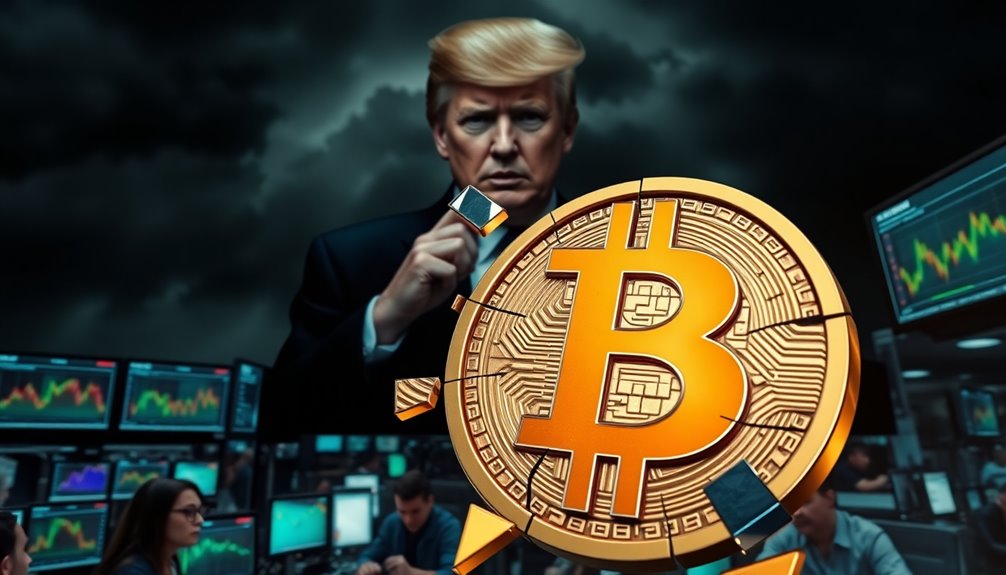Trump's crypto policies could indeed send Bitcoin plummeting to $80K. His push for clearer regulations may create initial uncertainty, which could shake investor confidence. If the SEC and CFTC adopt less aggressive enforcement, it might seem like a win, but without strong safeguards, volatility could spike. Big trades from crypto whales can exacerbate price drops during uncertain times. Plus, as corporations invest more in crypto, market dynamics shift, affecting Bitcoin's value. Understanding these complexities is crucial for anticipating future price movements. Stay tuned to uncover more about how these factors influence Bitcoin's journey.
Key Takeaways
- Trump's regulatory approach may create uncertainty, causing market volatility that could lead Bitcoin prices to drop significantly.
- Clearer regulations might limit speculative trading, resulting in reduced demand and lower Bitcoin valuations.
- If institutional investors lose confidence due to stricter regulations, it could lead to significant sell-offs, pushing prices down.
- The SEC's less aggressive stance may not alleviate fears of future regulatory changes, impacting market sentiment negatively.
- Increased consumer protection measures could restrict market access, leading to diminished trading volumes and a potential price decline.
Trump's Crypto Regulatory Impact

Although the regulatory landscape for cryptocurrencies has often seemed murky, Trump's approach aims to bring clarity and transparency to the sector.
By collaborating with key government bodies like the SEC, CFTC, and Treasury, he plans to cultivate a more welcoming environment for crypto. This effort could lead to clearer guidelines and consistent regulatory frameworks, which might spur global adoption and innovation. Furthermore, the potential to influence policy decisions affecting the crypto landscape can bolster investor confidence in the market. Establishing clear regulations could also enhance the appeal of Bitcoin IRAs as a viable investment option for retirement savings.
Shifting away from "regulation by enforcement," Trump's administration intends to establish comprehensive frameworks for digital assets. The focus on consumer protection ensures public welfare while balancing industry influence.
Ultimately, this could position the U.S. as a leader in digital asset innovation, encouraging other nations to adopt similar policies that foster a thriving crypto ecosystem.
Trump's New Regulatory Framework

As Trump's administration formulates its new regulatory framework for cryptocurrencies, it aims to create a more transparent and supportive environment for digital assets. You'll notice the SEC is likely to adopt a less aggressive enforcement approach, focusing on actual fraud rather than registration issues. Expect new regulations that clarify digital asset definitions, providing the clarity market participants crave. The appointment of Paul Atkins signals a shift in leadership that favors collaboration over enforcement. Additionally, the FIT 21 Act will aim to establish jurisdictional clarity between the SEC and CFTC. This comprehensive framework will balance consumer protection with market access, ultimately enhancing the financial landscape for both traditional institutions and crypto-native companies. The SEC's potential for new regulations may further streamline compliance for emerging crypto projects.
Bitcoin Volatility and Trading Volume

Bitcoin's volatility and trading volume are intertwined, making the cryptocurrency market both exciting and unpredictable. Regulatory changes can swing market sentiment dramatically.
For instance, when China banned Bitcoin activities, prices plummeted. Conversely, anticipation of a spot Bitcoin ETF approval can send prices soaring. This regulatory uncertainty often leads to sharp price swings, as investors react emotionally to news and social media updates.
Limited supply amplifies these fluctuations, especially when whales make large trades, impacting liquidity. As more participants enter the market, the ongoing price discovery process adds to the volatility. The lack of institutional safeguards makes Bitcoin vulnerable to abrupt regulatory changes, which can lead to increased volatility.
With greater engagement and clearer regulations, Bitcoin could stabilize, but until then, the market remains a rollercoaster of emotions and rapid movements.
Corporate Investment Trends

With the rise of digital assets, companies are increasingly recognizing the potential benefits of incorporating crypto into their financial strategies.
Venture capital investment in crypto has surged, doubling to $1.5 billion in just three months, with 6% of US VC deals now targeting crypto.
Institutional participation is also growing, with 35% of institutions allocating 1%-5% of their portfolios to digital assets. Many are planning to scale investments, particularly in tokenized assets. Additionally, as institutions expect consistent growth in digital asset allocations over the next few years, the corporate landscape is likely to shift even further toward embracing cryptocurrencies. This trend aligns with the growing demand for transparency in private equity, as companies seek to showcase their crypto investments clearly.
Moreover, companies like MicroStrategy are actively allocating treasury reserves to Bitcoin, supported by new accounting standards.
This strategic approach not only enhances balance sheets but also increases shareholder value, showcasing a robust shift toward corporate adoption of cryptocurrencies.
Election Campaigns and Cryptocurrency

While the political landscape evolves, cryptocurrency is becoming increasingly influential in election campaigns, reshaping how candidates connect with voters.
The Federal Election Commission allows crypto contributions, and states like California and Ohio are embracing these donations, enhancing the political landscape. This endorsement of crypto contributions aligns with the growing trend of investment diversification, as candidates seek to broaden their funding sources.
Crypto PACs, such as Fairshake, have raised significant funds to support pro-crypto candidates, impacting elections in states like Montana and Ohio. Crypto PACs have invested over $100 million to support pro-crypto candidates, showcasing the financial power of this movement.
Candidates are recognizing the importance of crypto voters, with a notable percentage saying a candidate's crypto stance influences their decisions.
Even Donald Trump has shifted his position, pledging support for the industry.
As the crypto community grows, candidates who understand and engage with this voting bloc may gain a crucial advantage in upcoming elections.
Market Reactions to Policy Changes

As policymakers tighten regulations, the cryptocurrency market often reacts with notable volatility and significant price fluctuations. When regulatory bans or stringent securities laws are introduced, you may notice a sharp decline in valuations. Non-recognition of cryptocurrencies as legitimate currencies can also lead to negative returns.
On the other hand, specific legal frameworks can boost market confidence, resulting in positive gains. Regulatory measures limiting interoperability with traditional financial systems typically trigger negative impacts, causing substantial market drops. You'll see increased volatility as institutional involvement ramps up, driven by short-term speculative gains.
Ultimately, the interconnectedness of cryptocurrencies means that any regulatory change can have widespread effects, making it vital for you to stay informed and adaptable in this ever-changing landscape.
Frequently Asked Questions
How Might Trump's Policies Influence Global Crypto Markets?
Trump's policies could significantly influence global crypto markets by introducing more favorable regulations and potentially repealing restrictive rules.
If he advances a strategic Bitcoin reserve, it could encourage other nations to follow suit, amplifying global adoption.
You might see increased institutional investment as banks gain more latitude to hold Bitcoin.
However, be cautious about market volatility, as price fluctuations could impact overall investor confidence and stability in the crypto landscape.
What Are Potential Implications for Individual Investors?
You might think investing in Bitcoin is a surefire way to wealth, but the reality could be quite the opposite.
If market volatility hits, you could see your investment plummet. With regulatory uncertainty and potential ETF outflows, your risk escalates.
Plus, if you're caught in pessimistic sentiment, it might feel like you're watching your money evaporate.
Will Trump's Policies Affect Altcoins Similarly to Bitcoin?
Yes, Trump's policies could affect altcoins similarly to Bitcoin.
You'll notice that regulatory changes could create a more favorable environment for altcoins, boosting investor confidence. Market sentiment might swing widely with his actions, impacting altcoin prices as well.
Additionally, any technological advancements or economic factors stemming from his policies could benefit altcoins.
Keep an eye on how industry reactions shape the landscape, as they'll play a crucial role in altcoin performance.
How Could Regulatory Changes Impact Crypto Mining Operations?
Regulatory changes can significantly impact crypto mining operations, affecting where you can mine, how much energy you'll consume, and what costs you'll face.
With state-level regulations favoring miners, you might see lower electricity rates but increased noise complaints from locals.
Federal frameworks could establish uniform rules, shaping the industry's future.
As countries impose bans or limitations, you'll need to adapt to a constantly shifting landscape, making strategic choices more critical than ever.
What Role Does Public Perception Play in Cryptocurrency Value?
Public perception plays a huge role in cryptocurrency value.
If you see a surge in confidence, like positive news or endorsements, you might feel more inclined to invest. Conversely, skepticism or negative media can lead to drops in prices.
Since many people base their decisions on what they hear from friends or social networks, your personal beliefs and the sentiment around you can significantly influence the market's fluctuations.
Conclusion
As Trump's crypto policies roll out, you might feel like Bitcoin's teetering on the edge of a cliff, ready to plummet to a shocking $80k. The volatility and uncertainty could send traders into a frenzy, making you question the very foundation of your investments. With corporate giants reconsidering their stakes, you could be left watching the market dance chaotically. In this wild ride, staying informed is your only lifeline—don't let the waves of change sweep you under!









